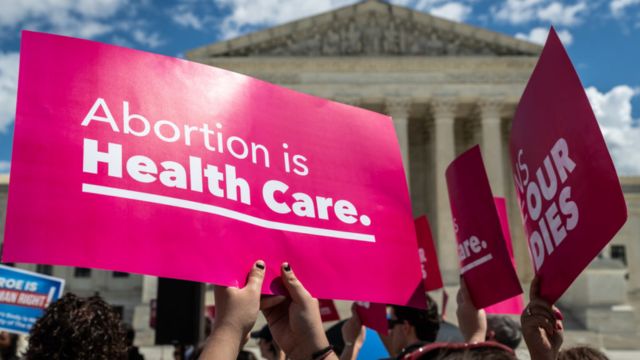Dr. Taylor Walker is a certified family physician who works at a clinic in Massachusetts and has witnessed an influx of women seeking an abortion from as far away as Miami-Dade County.
In her role as president of the Committee of Interns and Residents, the nation’s largest union representing tens of thousands of interns, resident physicians and fellows, she’s seeing another trend: future doctors are avoiding doing their residency in states with strict abortion bans.
Walker, who works in a clinic in the Boston area, said the abortion bans throughout the South, including Florida, are forcing more and more women out of state to have the procedure.
Several southern states have imposed restrictive abortion laws in recent years. Alabama bans almost all abortions. Georgia has a six-week ban in place and North Carolina, which allows the procedure until 12 weeks, has a 72-hour waiting period after mandatory in-person counseling. Florida’s six-week ban went into effect last May.
In Massachusetts, most abortions are legal through 23 weeks and six days.Some patients choose the state if they have a support network there. Walker told WLRN her Haitian patients from South Florida may prefer the Boston area, where roughly 25,000 Haitians reside.

“Anytime patients are seeking this type of sensitive, almost intimate type of health care, feeling safe is super, super important,” Walker said. “Folks in Florida are talking to people who they know, whether that’s within the Haitian community or just friends and family.”
She said Massachusetts government officials have put financial resources into subsidizing the costs of receiving care from out-of-state clients, including the costs of hotel or the procedure itself.
Abortion bans impact doctors, too
Walker points to the effect of state bans like Florida’s on doctors, too.
Texas Challenges Federal Rule on Abortion Privacy in Lawsuit Against Biden Administration
After medical school students graduate as physicians in the U.S., they typically apply for residency programs specific to their specialty. Those who wish to provide abortions tend to pursue residencies in obstetrics and gynecology, or OBGYN, and family medicine.
They’re also having to think, ‘I don’t want to train in a state where I am not able to get training in the full scope of my practice and the full scope of my specialty because of restrictive state laws.’
Dr. Taylor Walker
According to a study published last February in JAMA Network Open, 44% of OBGYN residents in the U.S. are training in a state with an abortion ban, like Florida. Walker said residents who are training in states with bans are not receiving medical training in the full scope of their practice.
“It’s very difficult to find time as an attending physician after residency to go and get specific training,” Walker said.
Earlier this year, the Association of American Medical Colleges, or AAMC, Research and Action Institute published new findings that U.S. medical school graduates are less likely to seek residency positions in states with abortion bans or strict restrictions.
“The number of medical graduates who are applying into residency programs in restrictive states, like Florida, has seen a significant decline due to these abortion restrictions,” Walker said. “Residents are in their 20s and 30s, and so they’re having to make choices based on their own reproductive options. They’re also having to think, ‘I don’t want to train in a state where I am not able to get training in the full scope of my practice and the full scope of my specialty because of restrictive state laws.’”
According to the AAMC findings, more people chose not to apply to programs in states with abortion restrictions in 2024 than in 2023, compared with how many applicants submitted applications to residency programs where abortion remains legal.
In the 2022-2023 application cycle, OBGYN programs in states with abortion bans saw more than a 5% decrease in applications from U.S. medical graduates. And about 73% of medical students applying into OBGYN programs in that same cycle indicated that the Dobbs v. Jackson Women’s Health Organization decision of the U.S. Supreme Court influenced where they would apply for their residency.
The Dobbs ruling in June of 2022 overturned the landmark 1973 Roe v. Wade decision, which constitutionally protected abortion access across the country for about 50 years. That’s why state legislatures like Florida’s may decide their own abortion restrictions.
“Legislative interference that imposes restrictions on full-scope reproductive health care, including abortion care, discourages medical students from pursuing residency training in states with restrictions, directly hurting patients by reducing the physician workforce in the communities that often need clinicians the most,” said Dr. AnnaMarie Connolly, chief of education and academic affairs of the American College of Obstetricians and Gynecologists, in a statement earlier this year.
In the upcoming Nov. 5 general election, Florida voters will decide whether to replace the six-week ban by enshrining abortion rights through viability in the state constitution. That would need at least 60% voter approval to pass.
Dr. Walker told WLRN that her own experience of having an abortion in her home state of Tennessee influenced her decision to pursue a career in medicine. A state law required Walker to wait to have the procedure until she could hear the fetal heartbeat.
Said Walker: “I’m gonna make sure that none of my patients go through something like what I just did.”




